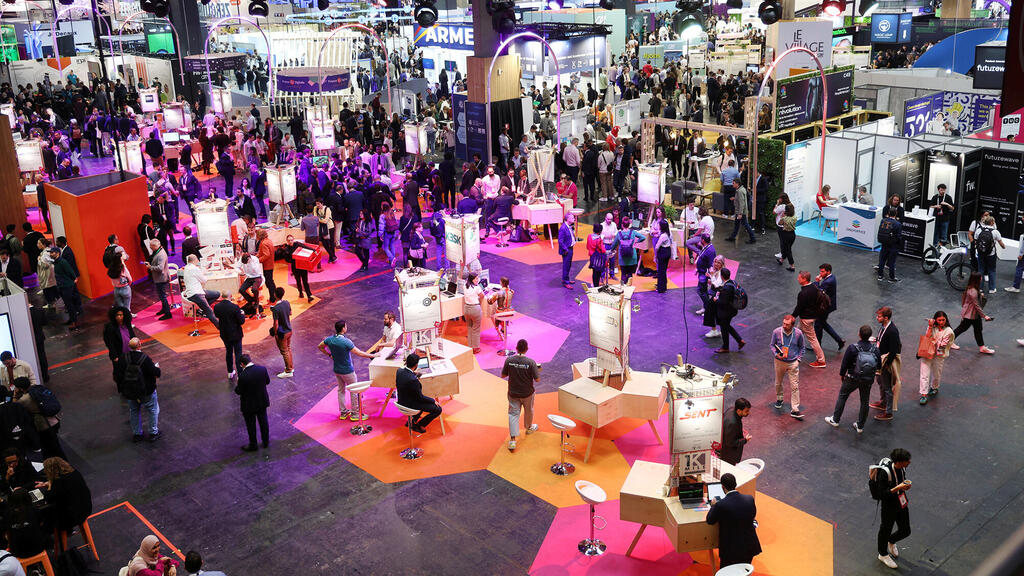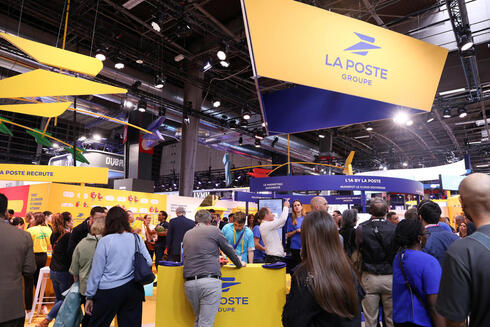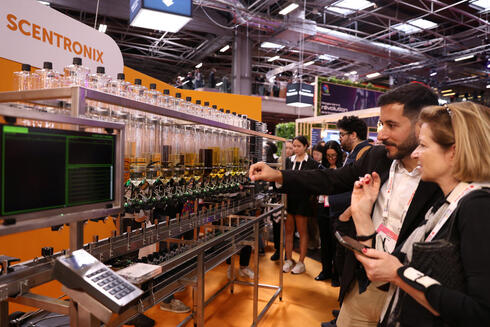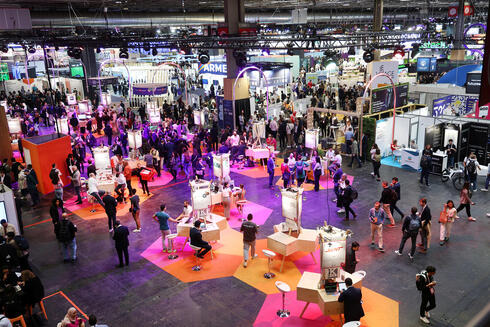
Paris 2024
VivaTech exhibition shows that the threat to Israeli tech will not come from France
Israel’s Business Delegation led by Calcalist and Bank Hapoalim toured the high-tech exhibition VivaTech in Paris, which is seeking to overtake Berlin as Europe’s main tech center. Much emphasis was placed on sustainability and fashion, artificial intelligence, but very little cyber - a relief for Israeli tech
Recycled paper bags made from fallen leaves, an AI-based kit to guide the blind, and personalized perfumes. These are just a few of the startups Israel’s Business Delegation led by Calcalist and Bank Hapoalim were exposed to at the VivaTech exhibition in Paris this week. VivaTech is a kind of French answer to CES, the giant electronics exhibition in Las Vegas, where thousands of visitors come to see the hottest new items in tech every year. The path to competing head-to-head with the American giant is still long, but thanks to the connections and influence of Maurice Lévy - who led advertising giant Publicis for decades and founded VivaTech in 2016 with the encouragement of the French government - the exhibition has attracted all the right names.
Last year, Elon Musk physically attended the exhibition. This year, he held a video session during which he answered participants' questions. "My greatest hope, in one word, is Mars. My greatest fear, in one word, is AI," Musk told attendees. John Kerry, the former US Secretary of State and one-time Democratic presidential candidate who lost to George W. Bush, visited the exhibition in person and noted that humanity is now undergoing the most significant economic transformation since the industrial revolution. He urged the tech industry to move faster to help preserve democracy worldwide, which is threatened in part due to AI.
In France, the very existence of the exhibition is considered to be of great importance after years of competing against the German tech ecosystem. In recent years, Paris has tried, and sometimes succeeded, to surpass Berlin as the central tech hub after London, but the battle is not yet over. French AI startup Mistral, the only European company that has challenged OpenAI, raising a record half a billion dollars since its founding, certainly gives a boost to France's tech image. Unsurprisingly, many of the companies presenting at VivaTech have naturally attached the letters AI to their names, but there were no heart-stopping innovations seen there.
In fact, at least in this regard, the Israeli high-tech community can breathe a sigh of relief - based on what was presented at the exhibition, the threat to the local ecosystem will not come from France. Moreover, after wandering the exhibition for several good hours (and yes, it is indeed possible to go through all the booths of all the companies in a few hours - an impossible task at CES), it becomes clear why foreign investors flock to Israel and how Israeli startups manage to raise capital even in the past eight months, amid one of the most severe security crises the country has known.
Related articles:
Several significant differences stand out when comparing the French tech scene to Israeli tech. Alongside artificial intelligence, a large part of the startups here are dedicated to solutions for climate and sustainability issues. Cybersecurity, for example, is almost absent. Visitors gather around the presentation of one of the truly interesting startups called RELEAF, which deals with the production of paper bags for the retail market from fallen leaves. After a brief inquiry, it turns out that this is actually a Ukrainian startup, which immediately grants it another level of sympathy from the audience.
The founder explains that Chanel, L'Oreal, and several other fashion brands already buy their leaf bags, which look like regular brown paper bags, and Forbes has marked them this year as one of the companies most likely to become a unicorn by 2025. The company has developed special machines that also preserve the leaves that fall only in autumn to allow continuous supply throughout the year and machines for producing the bags. Currently, its manufacturing is based in Ukraine but will also open a plant in France.
Another attraction for the crowd is a startup called Scentronix which produces personalized perfume, where the customer chooses their preferred combination from over 40 ingredients and ensures that they will be the only one in the world with that scent. The company keeps the unique composition created for each person, and it can be reordered, provided it survives the competition against Chanel, Dior, and dozens of other cosmetic companies with years of experience in identifying the most sought-after scents in the world.
And speaking of perfumes, it's hard to ignore that we are in France, even at a tech exhibition. Although dozens of booths of AI, robotics, and computing companies are scattered across the large exhibition complex, most of the crowd eventually converges on two large pavilions set up in the center. These don’t belong to NVIDIA or Amazon, Google, or Microsoft, but L'Oréal and LVMH, which dominates most luxury brands from Louis Vuitton to Tiffany, one of the latest additions to Bernard Arnault's portfolio, who also came to award an innovation prize at the exhibition. The crowd gathers in these two pavilions, willing to wait in long lines just to receive personalized hair products or AI-based skin diagnostics, contributing to the companies' databases in the process. Tiffany offers the option to visualize a ring on the specific finger of the visitors, and Dior uses artificial intelligence to understand which perfume you might prefer.
In fact, as you ascend the escalators leading to the more peripheral part of the exhibition, where you can find booths of Israeli companies Monday.com and AI21, it becomes clear that most of the exhibition space is not occupied by startup companies, but by French regions showcasing their innovative offerings and by large French corporations, from energy to banking, mainly presenting the selected startups they have invested in. This is another major significant difference compared to the Israeli startup world: there is hardly any American funding here.
A brief conversation with the founders and managers of the presenting startups reveals that most of them have very few investors, often one of whom will be a French governmental entity, a family office, or a giant French company operating in a related field. As a result, the funding amounts are generally smaller. On the other hand, these startups do not need the large resources that Israeli companies require, which must sell in the American market almost immediately upon their establishment. The local startups are much more relaxed, as the European market is accessible and close to home.
Thus, among the high-tech company booths, there is also a notable pavilion of French postal company La Poste. The French postal service, which is still government-owned (while in Israel, it is in the process of completing privatization), emphasizes innovation and technology and invests in startups. La Poste also has an incubator for investing in startups, and at their booth in the exhibition, they even set up a recruitment station for technology workers.
La Poste showcased some of their latest developments, for example, digital package collection stations that operate using solar energy. The advantage is that they can be distributed without the need for electrical infrastructure to operate the station. There are currently 300 such stations representing 15% of all package collection stations, with the goal of having 50% of the stations run on solar energy by 2026.
Recently, La Poste has begun implementing another development in package collection: collection lockers combined with fitting rooms. These lockers will be used to collect online shopping orders (mainly in fashion), and immediately upon collection, the clothes can be tried on. If they do not fit, they can be returned directly to the locker, and from there, they will be sent back to the seller. This development is still in its initial deployment stage, with six active stations currently, but the plan is to reach 300 such stations by the end of next year.
At the BNP booth, one of the largest banking groups in Europe, and particularly in France, they also showcased their tech investments, proudly stating that their investments are mainly in the US, Europe, and Israel. Including Israel in this select list shows that Israeli high-tech still holds prestige, an impressive achievement overall, and especially in this period when Israel's political status is deteriorating. However, the absence of an official Israeli pavilion at the tech exhibition is noticeable, particularly when countries like the UAE, Ivory Coast, and Armenia have a presence.


